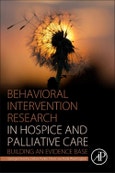Behavioral Intervention Research in Hospice and Palliative Care: Building an Evidence Base sets forth research considerations and guidelines to build evidence-based interventions to improve end-of-life care. It is an in-depth introduction to implementation research and showcases how a clinical need is identified to inform an intervention. The book extensively examines the various phases of intervention research, including design, implementation, evaluation, dissemination and translation. The book focuses on methodological, ethical and practical issues.
The science behind the quality of hospice and palliative care lags behind that of traditional medical practice, despite the continuous growth of palliative care interdisciplinary teams. Researching, developing and testing strategies is essential to advancing the effectiveness and value of this care.
Please Note: This is an On Demand product, delivery may take up to 11 working days after payment has been received.
Table of Contents
1. A Roadmap to Behavioral Intervention Research in Hospice and Palliative Care2. The Foundations of Behavioral Intervention Research in Hospice and Palliative Care
3. Defining and Analyzing the Problem
4. Designing an Intervention
5. Planning, Pilot-Testing and Refining the Intervention
6. Conducting a Clinical Trial
7. Disseminating Findings and Translating the Intervention








